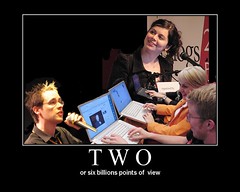 I’m fickle.
I’m fickle.
I forget most movies the day after I watch them. Same for most books. Rarely do I want to see or read something a second time. So Monday’s video comes courtesy of a movie I have now watched twice and am actually thinking about getting a copy of the sound track and DVD – Across the Universe . (Sorry, I did not embed it. Tech issue.)
I was wondering why I like to hear music over and over again – a different pattern from books or movies. Then I realized Across the Universe is, in fact, a musical. And the other movies I have watched more than once have most often been musicals.
What is is about musicals?
If I look at the golden age of musicals they are often racist and sexist. But they, like our society, have evolved to convey real issues.
And they have music.
The music carries two things for me. One is emotion. I think of songs as the soundtrack of my life, and they bring both a deeper connection with the emotion of the text and they embed a memory deeper in my brain.
The other is the switch between dialog and music allows us to step outside of our daily concept of “reality.”
It is like when I’m on a plane, 30,000 miles above terra firma and I can reflect on the world in a way that is different on the ground. A step away that gives a step closer to clarity.
There is a connection here with my recent playing with visuals. The addition of a different type of aural experience changes how we perceive something. I wrote a while back about the impact of adding music as background to a focus chat. Facilitators often prime a room by having music playing as people arrive for a gathering. My dance and yoga teachers set the tone with their choice of music.
Is a fully lived life a musical?
 But dang, it can be useful. Here is a great example from travel guru/insider
But dang, it can be useful. Here is a great example from travel guru/insider 
